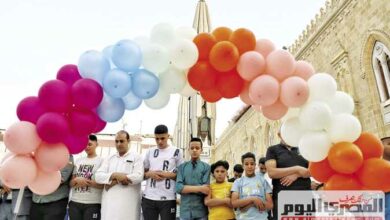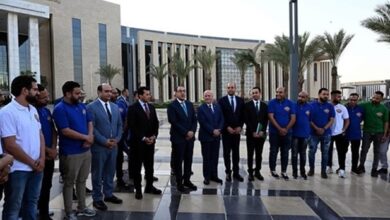The suspect recites Quranic verses as he walks down a long corridor, held by the arms by two plainclothes police who are marching him to the state security prosecutor’s office.
“I am willing to listen to the whole Quranic chapter, especially as you have a nice voice, but we should start the interrogation,” says the softly-spoken prosecutor who is about to question the suspect, a young member of the Muslim Brotherhood accused of instigating violence on a university campus.
“And I am ready,” replies the prisoner in a friendly tone.
This cordial exchange is not real, but fictional. It is one of the most problematic scenes of Al-Gama’a, or “The Group,” a television serial that seeks to portray “the truth” about the Muslim Brotherhood, Egypt’s largest Islamist group.
As soon as the holy month of Ramadan kicked in last week, the most anticipated show started to roll on state-owned television. With his incendiary narrative, prolific screenwriter Waheed Hamed has provoked a stir among both the Muslim Brotherhood’s sympathizers and critics who contend that the author is paying lip service to Egypt’s most notorious state security apparatus.
“This show is written from the perspective of the security apparatus,” said Mohsen Radi, a Muslim Brotherhood member of the outgoing parliament. “It says that both the [ruling] National Democratic Party and the Muslim Brotherhood are wrong, but the police are angels.”
This view is not restricted to the group’s most devoted cadres but is also shared by young reform-minded Islamists who broke ranks with the Muslim Brotherhood for its conservatism and ambiguous position on democracy
“It's a comedy,” said Abdelmonem Mahmoud, a 31-year-old blogger and former Muslim Brotherhood activist.
“The state security police are represented as if they were nurses in the best private-owned hospital. I wish I went to that place,” added Mahmoud, who has been in the shoes of the show’s suspects three times since 2003–the treatment he received was strikingly different to that portrayed on the show.
“Once I spent 13 days in the state security headquarters,” said Mahmoud.” I was blindfolded and handcuffed throughout that period and I used to be punched and beaten with sticks."
The show’s protagonist is Ashraf Helal, a young, humble and well-read state security prosecutor who gets assigned to investigate the involvement of Muslim Brotherhood students in violent acts. He interrogates his suspects with exceptional humility and respect, addressing them formally with the title "Mister"–none of which matches the reputation of the notorious agency.
After listening to their stories, Helal feels the urge to delve deeper into the history of the group to decipher the motives of the young activists. He picks up the memoirs of the group’s founder Hassan al-Banna and uses them as his gateway to understanding the group’s roots and outlook.
At this point, the show takes millions of Arab viewers on a flashback to tell the story of the region’s oldest Islamist opposition group.
So far, the Muslim Brotherhood has not issued any official statement to protest the show. However, Hamed’s account has provoked isolated reactions from many prominent members in the group.
“The show aims to serve the regime and distort the image of its main contenders ahead of the parliamentary elections,” said Saif al-Islam Hassan al-Banna, son of the group’s founder and a Muslim Brotherhood senior member.
The junior al-Banna is expected to file a suit within the next few days asking for the suspension of the show until it receives the full endorsement of the family. “This is our natural right; according to intellectual property rights law the character’s heirs should read the script before it gets approved,” said al-Banna, who is also the secretary-general of the Lawyers’ Syndicate.
In 1928, Hassan al-Banna founded “the Society of the Muslim Brothers” in Ismailia to restore the Islamic faith through guidance and preaching.
By the time of the Second World War, the society had become the most important political force in the country and grouped under its umbrella different social strata.
In the 1940s, al-Jihaz al-Khas, or the "Secret Apparatus," the group’s militant wing, was held responsible for several assassinations and kidnappings, and for planting bombs in cinemas and bars. In response, al-Banna was allegedly assassinated by the government in 1949, however, the group continued to exist.
It was not until the mid-1950s when the group was at serious risk. After a failed attempt on President Gamal Abdel Nasser’s life in 1954, the group’s leaders were harassed, arrested, executed or forced out of the country.
In the 1970s, this overt antagonism between the ruling regime and the Brothers was reversed. President Sadat freed their leaders and allowed them back onto the political scene in order to defeat his leftwing foes. Since then, the group has renounced violence and affirmed the full dismantling of its military wing.
“Unlike what the group is claiming, Hamed succeeded in reading the true nature of the group correctly,” said Amr al-Choubaki, an analyst with al-Ahram Center for Political and strategic studies and an expert on the Muslim Brotherhood. “It is a regressive and undemocratic group that is only preoccupied with its survival.”
“However, Hamed fell into the trap of portraying it as a violent group. The Muslim Brotherhood is not a violent group,” added al-Choubaki
The show begins with an episode that draws on a true incident when Muslim Brotherhood students held demonstrations on al-Azhar and Cairo University campuses to protest vote rigging in the 2006 student union elections. At Al-Azhar University, demonstrators held a military-like parade that sent shock waves to many observers, who questioned the group’s claim of renouncing violence.
In Al-Gama’a, the protests culminate in violent clashes between Muslim Brotherhood-affiliated students and their government-backed adversaries. The climax comes when an Islamist activist kneels down, grabs a brick and throws it at his adversaries, signaling the inception of a bloody fight with face-masked Muslim Brothers throwing molotov cocktails at their classmates.
Upon their arrest, the Muslim Brotherhood suspects are not subjected to any human rights abuses–on the contrary they are well-treated and served coffee and tea at the state security headquarters.
Al-Choubaki shrugs off the portrayal of the police as a “flagrant hypocrisy.” “He [Hamed] was not required to talk about the violations committed by the security apparatus, but he did not have to flatter it either,” said al-Choubaki.
Hamed, one of Egypt’s leading screenwriters, has tackled Islamist groups in many of his cinematic and TV works. He usually portrays them as corrupt opportunists who exploit religion to achieve their vested interests. When asked to comment on the accusations leveled by his detractors, that Al-Gamaa serves to flatter the police, Hamed replied in a strongly-worded tone. “Those who say such things are sons of …. I don’t need to reply to anyone.”
Under Mubarak, the Muslim Brotherhood has proven to be a force to be reckoned with on campuses, in syndicates, and even in parliament. In 2005, they chalked up an unprecedented victory by grabbing 88 seats and rising as the largest opposition bloc.
Officially the group remains banned and subject to regular raids and arrests. Yet, its members are allowed to participate in all levels of elections and write in the local papers. The group is expected to field 150 candidates in the parliamentary elections set for October.
Like many secular intellectuals, Hamed faces the dilemma of choosing between two evils: the regime and the Muslim Brotherhood, according to al-Choubaki.
“Many of the political intellegentsia tend to go for the regime, which is fine, but the problem here is that Hamed chose the state security apparatus, which is the worst body in the ruling regime,” said al-Choubaki.




